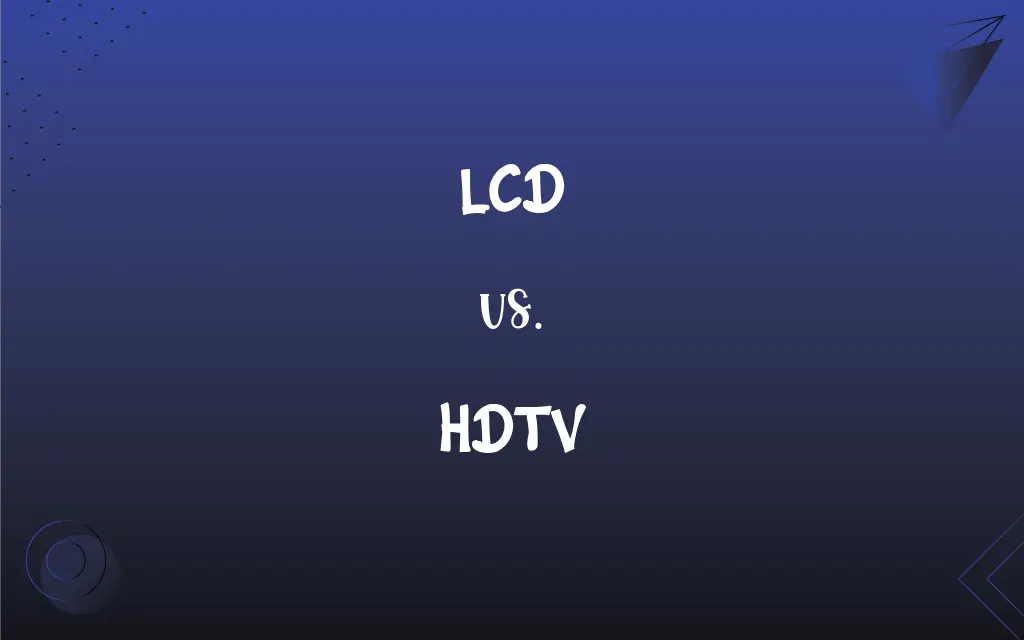LCD vs. HDTV: What's the Difference?
Edited by Aimie Carlson || By Janet White || Published on December 23, 2023
LCD refers to a display technology using liquid crystals, while HDTV is a broadcasting standard offering high-resolution content.

Key Differences
LCD technology uses liquid crystals sandwiched between layers of glass or plastic. It modulates light to produce images. HDTV (High Definition Television): HDTV refers to a broadcasting format that offers higher resolution and clarity compared to standard definition.
LCD screens are energy-efficient, have good color accuracy, and offer sharp images. HDTV Impact: HDTVs enhance the viewing experience with greater detail and more lifelike images.
Many modern devices, including smartphones, monitors, and TVs, use LCD technology. HDTV Standard: HDTVs have become the standard in television broadcasting, replacing older, lower resolution formats.
LCDs can suffer from motion blur and limited viewing angles. HDTV Content: The full benefit of HDTV is seen when viewing high-definition content, which is increasingly widespread.
LCD technology continues to evolve, with improvements in resolution and energy efficiency. HDTV and LCD Intersection: Many modern LCD TVs are also HDTVs, combining both technologies for a superior viewing experience.
ADVERTISEMENT
Comparison Chart
Technology Type
Display technology
Broadcasting format
Primary Use
In screens for TVs, monitors, and smartphones
In televisions for enhanced viewing quality
Image Quality
Depends on resolution and screen size
Higher resolution, better clarity
Power Consumption
Generally lower
Varies with screen technology
Content Compatibility
Compatible with various content formats
Best with high-definition content
ADVERTISEMENT
LCD and HDTV Definitions
LCD
Used in a variety of devices.
From calculators to laptops, LCD screens are everywhere.
HDTV
Delivers superior picture and sound quality.
HDTV broadcasting makes movies look more cinematic.
LCD
A screen technology using liquid crystals.
The smartphone features a bright, colorful LCD.
HDTV
Now a common standard in television.
Most channels now broadcast in HDTV quality.
LCD
Characterized by slim, lightweight screens.
The LCD TV's slim design fits perfectly in small spaces.
HDTV
A television standard with high-resolution.
Watching sports on an HDTV brings every detail to life.
LCD
Offers sharp images with good color accuracy.
The graphics look particularly vivid on this LCD.
HDTV
Offers a more immersive viewing.
Nature documentaries are stunning on an HDTV.
LCD
Known for lower power consumption.
I prefer LCD monitors for their energy efficiency.
HDTV
Supports various high-definition content.
My Blu-ray collection looks incredible on the HDTV.
LCD
A digital display that uses liquid crystal cells that change reflectivity in an applied electric field; used for portable computer displays and watches etc.
HDTV
A television system that has more than the usual number of lines per frame so its pictures show more detail
FAQs
Are all LCDs in color?
Most modern LCDs are in color, though some specialized displays may be monochrome.
Can LCD screens burn-in?
LCD screens are less prone to burn-in compared to plasma or OLED.
What does LCD stand for?
LCD stands for Liquid Crystal Display.
Do LCDs work well in sunlight?
LCDs can be harder to read in direct sunlight compared to some other display types.
Can HDTV display 4K content?
Only 4K HDTVs can display 4K content; standard HDTVs cannot.
What does HDTV stand for?
HDTV stands for High Definition Television.
Do I need a special antenna for HDTV?
You may need an HDTV-compatible antenna for over-the-air broadcasting.
Is LCD better than LED?
LCD and LED have different advantages; LED is generally brighter and more energy-efficient.
Are all new TVs HDTV?
Most new TVs are HDTVs, offering higher resolution than standard definition.
Are LCD TVs also HDTVs?
Many LCD TVs are HDTVs, but not all. It depends on the resolution.
What's the lifespan of an LCD TV?
LCD TVs typically last around 50,000 to 60,000 hours.
Are all HDTVs flat screen?
Most HDTVs are flat screen, but older models might be bulkier.
What's the main benefit of HDTV?
The main benefit of HDTV is its high resolution and picture quality.
Can LCD screens be recycled?
Yes, LCD screens contain materials that can be recycled.
Does HDTV require a digital signal?
Yes, HDTV requires a digital signal to display content.
Can I watch 3D movies on HDTV?
Only if the HDTV is 3D-compatible and you have the necessary glasses and content.
Is HDTV the same as Ultra HD?
No, Ultra HD (or 4K) has a higher resolution than standard HDTV.
Is HDTV better than SDTV?
Yes, HDTV offers better resolution and quality than SDTV (Standard Definition TV).
Do LCDs have a refresh rate issue?
Some older LCDs might have lower refresh rates, affecting motion display.
Is LCD technology still evolving?
Yes, LCD technology continues to improve in terms of efficiency and display quality.
About Author
Written by
Janet WhiteJanet White has been an esteemed writer and blogger for Difference Wiki. Holding a Master's degree in Science and Medical Journalism from the prestigious Boston University, she has consistently demonstrated her expertise and passion for her field. When she's not immersed in her work, Janet relishes her time exercising, delving into a good book, and cherishing moments with friends and family.
Edited by
Aimie CarlsonAimie Carlson, holding a master's degree in English literature, is a fervent English language enthusiast. She lends her writing talents to Difference Wiki, a prominent website that specializes in comparisons, offering readers insightful analyses that both captivate and inform.































































